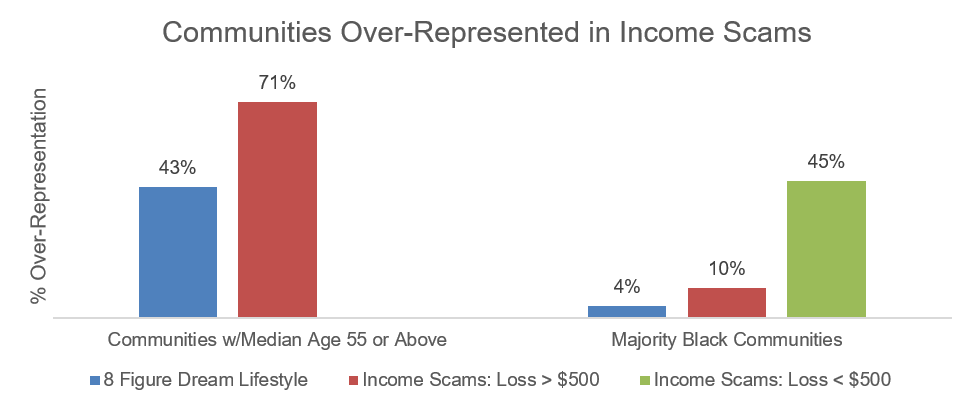The FTC and its law enforcement partners announced actions against several income scams that conned people out of hundreds of millions of dollars by falsely telling them they could make a lot of money. One of those scams was 8 Figure Dream Lifestyle, which touted a “proven business model” and told people they could make thousands of dollars in a couple of weeks if they paid to join the program. The FTC says those income claims were false. Customers paid between $2,395 and $22,495 to get started, and many took personal loans or racked up credit card debt to buy in. Approximately 94% of those customers lost money, with losses averaging almost $10,500 per person. That’s equal to two months of take-home pay for someone making the median household income.
FTC economist Devesh Raval matched the addresses of the 8 Figure Dream Lifestyle customers to U.S. Census Bureau data to learn how the scam impacted different communities. He found that the percentage of customers who lost money and live in zip codes that skew older (median age of 55 or above) was 43% greater than their share of the population. In other words, they were over-represented in the 8 Figure Dream Lifestyle customer database.
Raval did a similar study of several cases the FTC has brought against other income scams. The analysis showed that these income scams affected different communities at different rates. Where the average loss to scams was more than $500, more of the people affected tended to live in zip codes that skewed older. Where the average loss to scams was less than $500, more of the people affected tended to live in zip codes with a majority Black population.

Savvy scammers know that many of us want financial freedom or to be our own boss. But as FTC cases show, many of these so-called opportunities are money-losing propositions. That's why it pays to learn how to recognize these scams. If you’re tempted by an opportunity like this, read When a Business Offer or Coaching Program is a Scam. It might save you from losing hundreds – or even thousands – of dollars. Share it in your community to help others recognize these scams. And if you see a scam like this, tell the FTC at ReportFraud.ftc.gov.

It is your choice whether to submit a comment. If you do, you must create a user name, or we will not post your comment. The Federal Trade Commission Act authorizes this information collection for purposes of managing online comments. Comments and user names are part of the Federal Trade Commission’s (FTC) public records system, and user names also are part of the FTC’s computer user records system. We may routinely use these records as described in the FTC’s Privacy Act system notices. For more information on how the FTC handles information that we collect, please read our privacy policy.
The purpose of this blog and its comments section is to inform readers about Federal Trade Commission activity, and share information to help them avoid, report, and recover from fraud, scams, and bad business practices. Your thoughts, ideas, and concerns are welcome, and we encourage comments. But keep in mind, this is a moderated blog. We review all comments before they are posted, and we won’t post comments that don’t comply with our commenting policy. We expect commenters to treat each other and the blog writers with respect.
We don't edit comments to remove objectionable content, so please ensure that your comment contains none of the above. The comments posted on this blog become part of the public domain. To protect your privacy and the privacy of other people, please do not include personal information. Opinions in comments that appear in this blog belong to the individuals who expressed them. They do not belong to or represent views of the Federal Trade Commission.
In reply to I want to know if I'm being by Roberta Schlat…
In reply to Frank works for nocorhe has a by Roberta Schlat…
That sounds like it could be a scam. Many romance scammers create fake profiles on social sites, or contact people through Facebook, or game sites. The scammers tell you personal details about their life and family very quickly, and show lots of affection. They try to gain your trust.
They may call or send text messages several times a day. They are often working far away, or get called to work far away. Then, they make up a story or have some emergency at work, and ask for money If you send money, or "lend" them money, you won't get it back. Even if he promises to return the money, you won't get it back.
This FTC article about romance scams tells more.